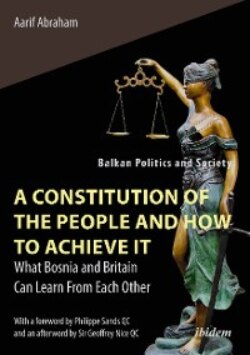A Constitution of the People and How to Achieve It

Реклама. ООО «ЛитРес», ИНН: 7719571260.
Оглавление
Aarif Abraham. A Constitution of the People and How to Achieve It
ACKNOWLEDGMENTS
FOREWORD
- Mak Dizdar, The Stone Sleeper 1. INTRODUCTION
1. “A text about a text”: constitutions of Britain and Bosnia. 1.1 Searching for the soul of a state
1.2 Overview of the British constitution
1.3 Overview of the Bosnian constitution
1.4 Comparative constitutional histories
2. “Look a shoot is sprouting”: measuring culture
2.1 Political culture in theory
2.2 Political culture in practice
2.3 Political culture applied to Bosnia and Britain
2.4 Problem of political apathy
3. “Going back to whence I sprang”: assessing apathy
3.1 A-systemic orientations
3.2 Anti-systemic orientations
3.3 Absence of interpersonal trust
3.4 Institutions as an explanation
4. “We’ve still not found a cure”: constitutional rules. 4.1 Constitutional choice and change
4.2 Recurrent crisis and rarefied reform in Bosnia
4.3 Rising strain amidst weak reform in Britain
4.4 Reform dilemmas and deadlock
5. “We need to uncover lost paths”: modelling change. 5.1 Modelling intransigence
5.2 Modelling the failure of reform
5.3 Modelling successful evolution in the short run
5.4 Modelling future co-operation and participation
6. “A text about hope”: lessons from Bosnia and Britain. 6.1 Debate, deliberation and participation
6.2 Lessons for Bosnia and post-conflict societies
6.3 Lessons for Britain and pre-conflict societies
6.4 Pathways out of constitutional quagmires
BEYOND LAW, PRESCRIPTIONS AND CONCLUSIONS
AFTERWORD
APPENDICES
GLOSSARY
REFERENCES
Отрывок из книги
ibidem-Press, Stuttgart
—past, present and future—
.....
REFERENCES
Chapter 4 sets out the literature and theoretical principles of institutional design and amendment. It explains why changing formal rules when the underlying beliefs or values of societies remain rigidly opposed will result in failed institutions; and why a failure to change the formal institutions when belief systems are conducive to change imperils those institutions. The sub-chapters set out the three major proposals that have been made to date to reform the Bosnian constitution and the reasons for their failure. The sub-chapters will contrast that experience with the outlier case of the unwritten constitution in Britain and various reforms made to it (with a focus on those made since 1997). The sub-chapters focus on Brexit, Scottish and Northern Irish secessionism, and the unlawful constitutional practices of recent British governments. They interrogate whether it is the existing unwritten constitution (which creates a system of representative parliamentary democracy) that is the source of these crises or, rather, the by-passing of existing constitutional conventions, rules, and institutions. In the one (Britain) it poses the question of whether abandonment of its traditional unwritten constitution is the problem and in the other (Bosnia) it asks whether the foundational moment of the imposed constitution is the source of all the problems. In essence, what can one State learn from the other as calls for reform ring loud?
.....